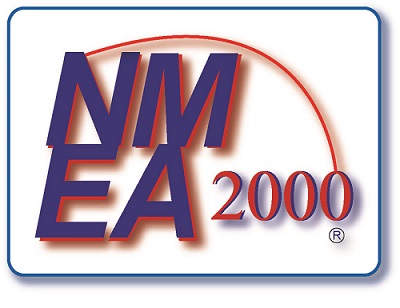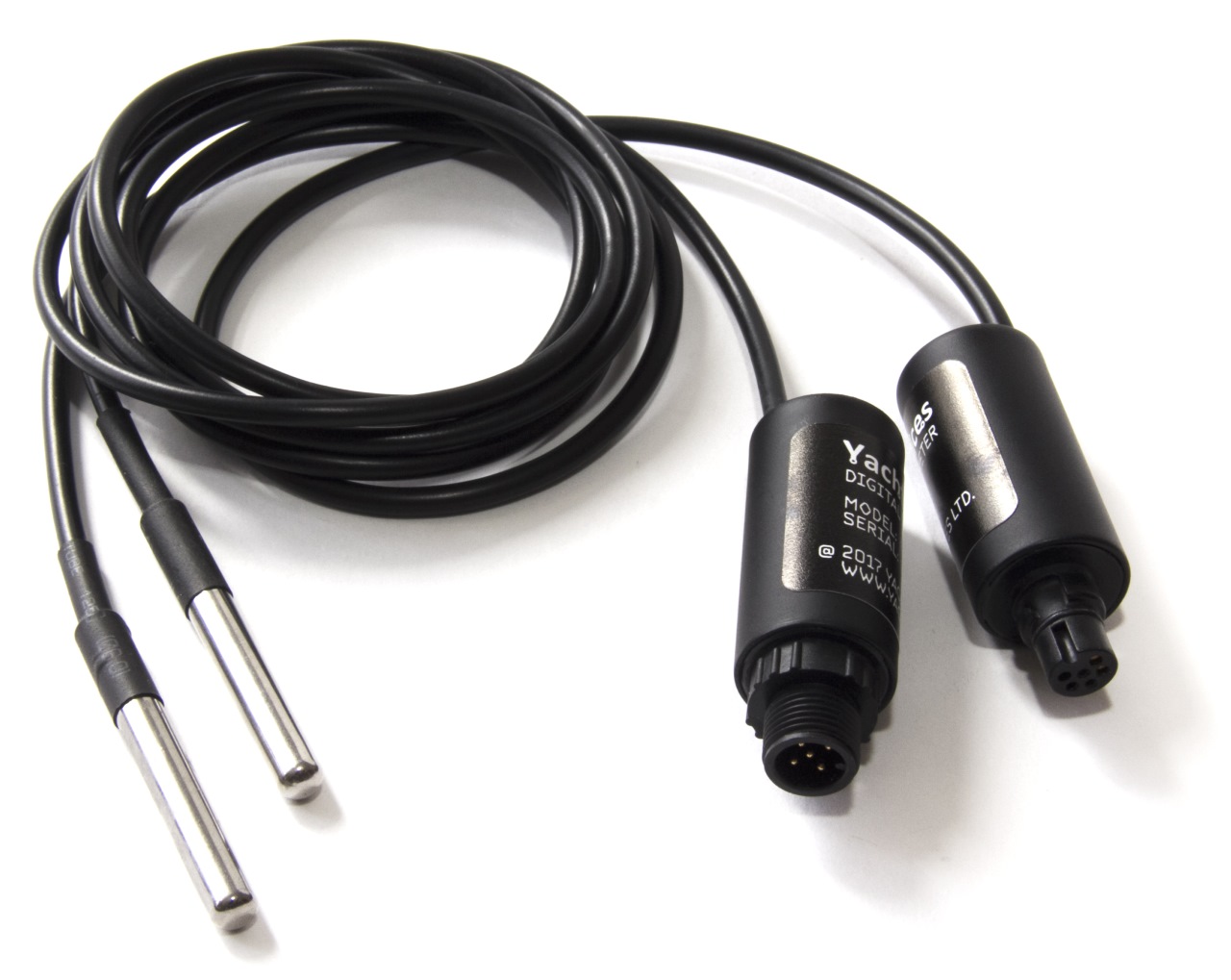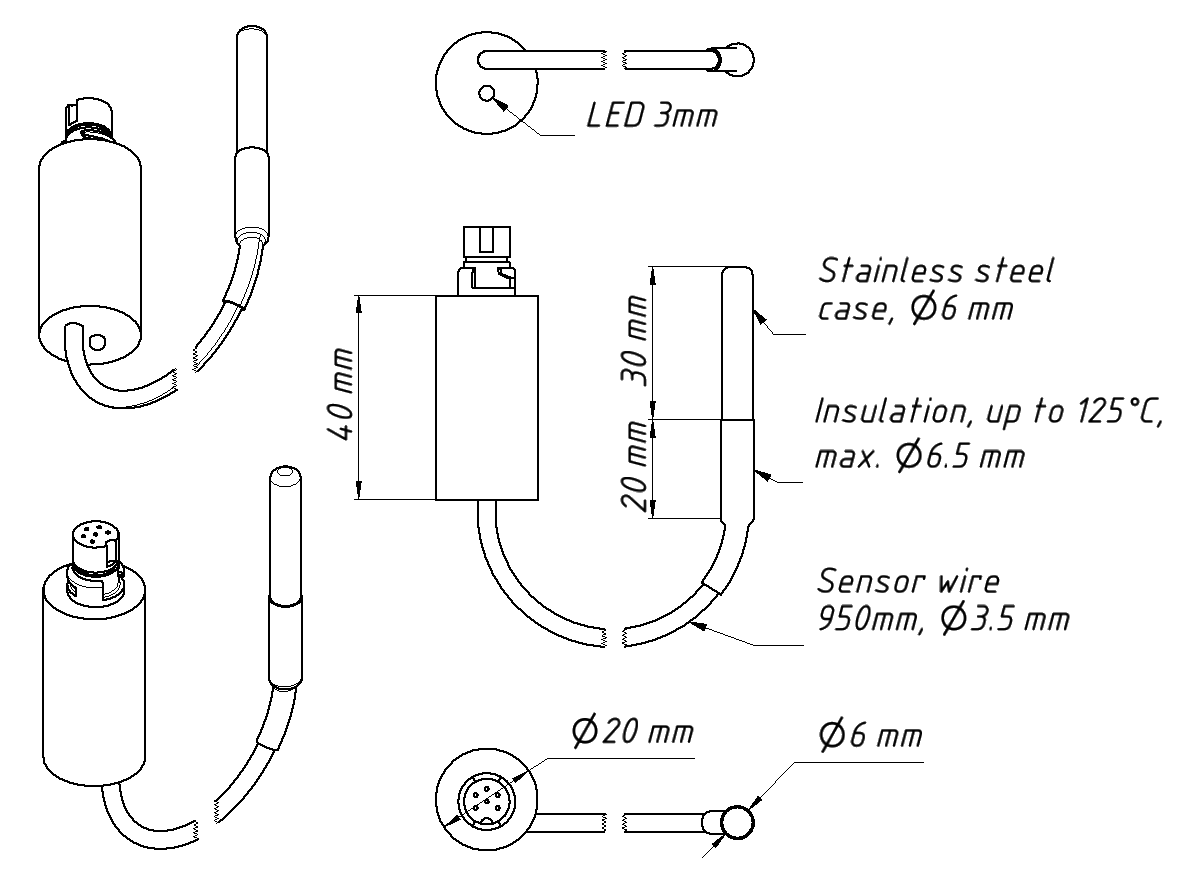The Thermometer performs measurements within the range from -55 to +125°C (-67..+257°F) with absolute measurement accuracy
The sensor is placed outside the case on a flexible, 95cm wire in a sealed stainless steel sleeve and can be used to measure the temperature of gases or liquids. If necessary, the wire can be elongated up to 100 meters. The Thermometer can be configured by the user to display data as "Air temperature" (factory setting), "Sea temperature", "Temperature in the refrigerator", "Temperature in the engine room", "Bait Well Temperature", etc.
Temperature data output resolution to a NMEA 2000 network is 0.01°C, absolute measurement accuracy
Picture 1. Digital Thermometers YDTC-13R and YDTC-13N
The Thermometer is plug and play. You only need to connect it to NMEA 2000 to get readings on any NMEA 2000 compatible chart plotter or instrument display. It can be used to monitor fridges and freezers, bait wells, air or sea temperature. Up to 50 devices may be used on a vessel simultaneously; this limitation is set by the network specification.
The Thermometer can be configured by user to turn on or off specified channels of digital switching equipment. For example, it can automatically turn on the sea water pump when the temperature in the live well is too high, and also turn it off when the temperature returns to normal (see Section VIII of the Manualfor details).
The measurements of the last 48 hours are stored in the Device's RAM and can be retrieved by compatible software or hardware to provide the user with historical data.
![]() All our sensors support firmware updates and three programming (configuration) methods, please, read this article for details. The simplest way is to use a special installation description string which can be entered for the device in some modern models of chart plotters or in special software. Here you can see a video how to program the Humidity Sensor using CAN Log Viewer software, programming of the Thermometer is the same.
All our sensors support firmware updates and three programming (configuration) methods, please, read this article for details. The simplest way is to use a special installation description string which can be entered for the device in some modern models of chart plotters or in special software. Here you can see a video how to program the Humidity Sensor using CAN Log Viewer software, programming of the Thermometer is the same.
![]() See our old video with reviews of devices, installation on a sailing yacht and programming from a Raymarine C90W chart plotter. This is a tricky way, but it works almost everywhere and no special equipment is required. Programming of the Thermometer changes "Air temperature" data type (factory setting) to "Sea temperature", or "Fridge temperature", etc.
See our old video with reviews of devices, installation on a sailing yacht and programming from a Raymarine C90W chart plotter. This is a tricky way, but it works almost everywhere and no special equipment is required. Programming of the Thermometer changes "Air temperature" data type (factory setting) to "Sea temperature", or "Fridge temperature", etc.
Support of the Thermometer in our other products:
- Web Gauges of NMEA 2000 Wi-Fi Gateway, NMEA 0183 Wi-Fi Gateway and NMEA 0183 Wi-Fi Router can display many temperature data types;
- the Thermometer can automatically manage loads connected to the Circuit Control YDCC-04;
- the NMEA 0183 Gateway and NMEA 2000 USB Gateway convert air, sea, inside (saloon) and dew point tempeatures to MDA, XDR, MTW sentences of NMEA 0183 and vice versa;
- the PC software of Voyage Recorder supports many temperature data types;
- the Text Display supports water and air temperatures;
- the CAN Log Viewer can update the Device's firmware, configure it, and display many temperature data types.
Order now and get our special offer: free world wide delivery!
 The Thermometer is certified by National Marine Electronics Association. The Device is designed for operation in an NMEA 2000 network and is compatible with a wide range of equipment supporting this protocol. Raymarine SeaTalk NG, Simrad SimNet, and Furuno CAN networks are branded versions of NMEA 2000 and differ only by connector type. Garmin uses the NMEA 2000 Micro connector in its devices, which is compatible with the DeviceNet Micro connector.
The Thermometer is certified by National Marine Electronics Association. The Device is designed for operation in an NMEA 2000 network and is compatible with a wide range of equipment supporting this protocol. Raymarine SeaTalk NG, Simrad SimNet, and Furuno CAN networks are branded versions of NMEA 2000 and differ only by connector type. Garmin uses the NMEA 2000 Micro connector in its devices, which is compatible with the DeviceNet Micro connector.
Picture 2. Drawing of YDTC-13R model of Thermometer
The Device is supplied with SeaTalk NG (YDTC-13R, see Picture 2) and NMEA 2000 Micro Male connectors (YDTC-13N), making it possible to connect it to networks of different manufacturers without any adapters. The Device model is shown on the case.
No free connectors on your bus? Not a problem! Device models with the T index at the end of their names contain a built-in terminator and are connected to the network instead of a terminator. This allows zero-cost connection of the Device to existing networks with no available connectors.
For additional technical details, please see the User Guide and FAQ.













